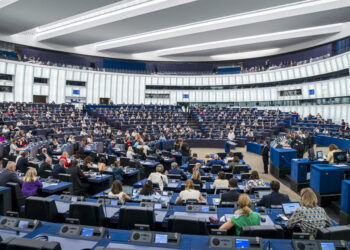Brussels – Over 1.1 billion euros of EU funding for at least 63 projects violate fundamental rights. Potentially more because the report by the NGO Bridge EU covers only six member states – Greece, Poland, Romania, Hungary, Bulgaria, and the Czech Republic. What is striking is the structural lack of supervisory mechanisms on the resources disbursed by the European Commission. The EU Court of Auditors had
sounded the alarm for EU programs involving Africa, and it was only the latest in chronological order.
The report is based on the findings of the FURI (EU Funds for Fundamental Rights) project, co-funded by Brussels and launched in 2024 to shed light on violations of fundamental rights linked to European resources. As often happens, minorities and disadvantaged groups are those who pay the price. Bridge EU has documented initiatives dealing with the segregation of Roma communities, the detention and pushback of migrants, and the exclusion of children with disabilities.
Two distinct types of cases emerge while browsing through the 63 projects analyzed: projects in which the objectives set should already set off alarm bells and projects that, even though they have the most noble intentions, end up having the opposite effect on the communities they affect. In both cases, with a few exceptions, the complaints of those involved have never been followed by sanctions, and the European Commission has rarely shut them down.
This is even though EU funding regulations explicitly stipulate the alignment of projects with fundamental rights. A disturbing point, which emerges from the interviews conducted with civil society organizations, public authorities, and fundamental rights bodies is that there is a “very low level of understanding of fundamental rights obligations and how these are to be respected.”
According to the report, a clear case of “passing the buck” exists between the European Commission and national authorities in assessing violations. In “all cases” analyzed, Brussels sought confirmation of a breach of fundamental rights from the competent national authorities. In “no case” did national authorities acknowledge the occurrence of discriminatory practices. On closer inspection, the conflict of interest appears evident because ‘the same public authorities responsible for designing and implementing the programs are in charge of assessing the complaints lodged against them.”
Perhaps “the most concerning finding” is the absence of follow-up or sanctions in “nearly all” complaints reviewed. The European Commission, which, according to Bridge EU, applies “a restrictive interpretation of what constitutes a violation of fundamental rights,” too often dismisses complaints without taking any action, despite credible evidence. The possibility of cutting funding is there, as shown by the case of Nyíregyháza, Hungary, “the only known exception” where Brussels suspended funding following confirmation of fundamental rights violations.
In Nyíregyháza, in the north-east of Hungary, Brussels was financing a project worth over EUR 4 million to renovate some of the infrastructure in the most disadvantaged urban areas of the city. Improved housing conditions, community development, and equal access to high-quality social, health, and public services were among the objectives mentioned for the project. However, the project involved relocating families into the neighborhood, resulting in a significant increase in both residents in the segregated area and students in the segregated school. Following a complaint, the European Commission looked into the folds of the project and confirmed discrimination in housing and school segregation. The funds were not reimbursed to the municipality of Nyíregyháza, and the local authority’s budget covered all costs.
In most cases, however, this does not happen. The logic that Brussels applies is that fundamental rights violations occurring during project implementation are the responsibility of the national authorities, whose task is to monitor and remedy them. In other words, too often, the European Commission disregards them. Yet, the NGO notes, “it has a legal basis to intervene and address the fundamental rights violations.”
English version by the Translation Service of Withub






